There is an impasse within the Wisconsin Elections Commission. Democrats and Republicans tied 3-3 on whether or not to purge more than 200,000 names off of the voter registration lists in Wisconsin, not three days after a circuit court ruled to immediately purge the names of those who are suspected to have moved. As of Jan. 14, Wisconsin’s District 4 Court of Appeals granted a stay temporarily stopping the purge of said voters and another stay blocking a ruling that would hold three WEC members in contempt.
This move comes at a critical time in our nation’s history as Wisconsin is playing a crucial role in the upcoming 2020 presidential election. As a battleground state, Wisconsin has been given special attention in the wake of the 2016 election, which left the state neglected by the Democratic party. Though these voters remain registered in Wisconsin, the razor-thin margins in the 2018 midterm elections make this ongoing legal battle one to watch out for.
The decision calls into question the legality of this move as it weighs heavy in the near future. Wisconsin is well within the bounds of the law to do this. The most hands-on law regarding voter registration and the removal of names off of registration lists is the 1993 National Voter Registration Act. The Act requires that voter registration lists be maintained and kept accurate while also providing safeguards against voter discrimination, mandating uniform, nondiscriminatory compliance with the Voting Rights Act of 1965 and not being changed within 90 days of the federal election.
This comprehensive piece of legislation tackles the issue of voters who have moved or died that remain on registration lists. States are not only allowed to purge names based upon reasonable evidence of excessive names — in the 2018 Supreme Court case Husted v. A. Philip Randolph Institute, the Court ruled that states can also remove voters after a number of years of inaction and missing response to a mailed warning.
The NVRA backs up this slim ruling from Ohio — which was cast along party lines — because a voting hiatus was not the sole purpose of removal, but the warning was not returned as well. The NVRA is also the basis for the lawsuits against the voter purge in Wisconsin.
But Wisconsin is exempt from this law because it has same-day registration. Same-day registration allows for anyone accidentally removed or not registered in the first place to register upon arrival at the polling place.
This is the holy grail of removing the administrative burden surrounding voter suppression, and also is what allowed the City of Madison to see a record-high voter turnout of 93% in the 2018 general election. This law is also the reason that voter turnout will not be suppressed, the action only erupting unnecessary political fighting within the already-tense state of Wisconsin.
Additionally, the basis for removal was through existing institutions like the Wisconsin Department of Motor Vehicles where permanent establishment of residence is based upon the frequency of visitation and reasons for a visit (for example, renewal of a license or obtaining a state ID). It signaled to the state a change in residence, thus the reasons for removal are not as imprecise as not voting for a couple of years.
What is more concerning about the nature and timing of this legislation is the precedent it might set for other states. As this is a move conducted by Republican lawmakers in a battleground state, other Republicans in battleground states may follow in their lead as a means of ensuring victory for their party.
This is especially concerning for states like Florida, Texas and Michigan who do not have same-day registration but a strong conservative base and, perhaps, an equally massive role in the upcoming election.
As for Wisconsin voters, have no fear. Even if your name was taken off the list mistakenly― as was the case for thousands of voters in 2017― same-day registration has your back and requires a simple proof of residence on the day of the election or prior registration online.
For those in other states worried about voter suppression through these voter purges — battleground state or not — consider donating to organizations such as Fair Fight 2020, an organization dedicated solely to ensuring the integrity of our elections. It actively works to fight voter suppression and foreign interference to reestablish the power of our democracy and foster a fair fight.
Increase in political consciousness, activity should give young people the right to vote
Regardless of your party or your state, be an engaged voter. Register and vote, then fight for those who do not have the right to vote. Wisconsin may not be affected this time, but in the era of political gladiator-fighting between everyone and their mother, investment and knowledge of the situation is key.
Refusal to vote immediately sacrifices your ability to criticize your elected leaders and reduces you into a simple observer of your own fate. Every ocean began with a drop of rain, and 2020 is going to be the monsoon of a lifetime.
Kaitlin Kons ([email protected]) is a sophomore studying political science and public policy.
Editors Note: A previous edition of this column mischaracterized the Wisconsin Election Commission’s decision. The error has been corrected. The Badger Herald regrets this error.














